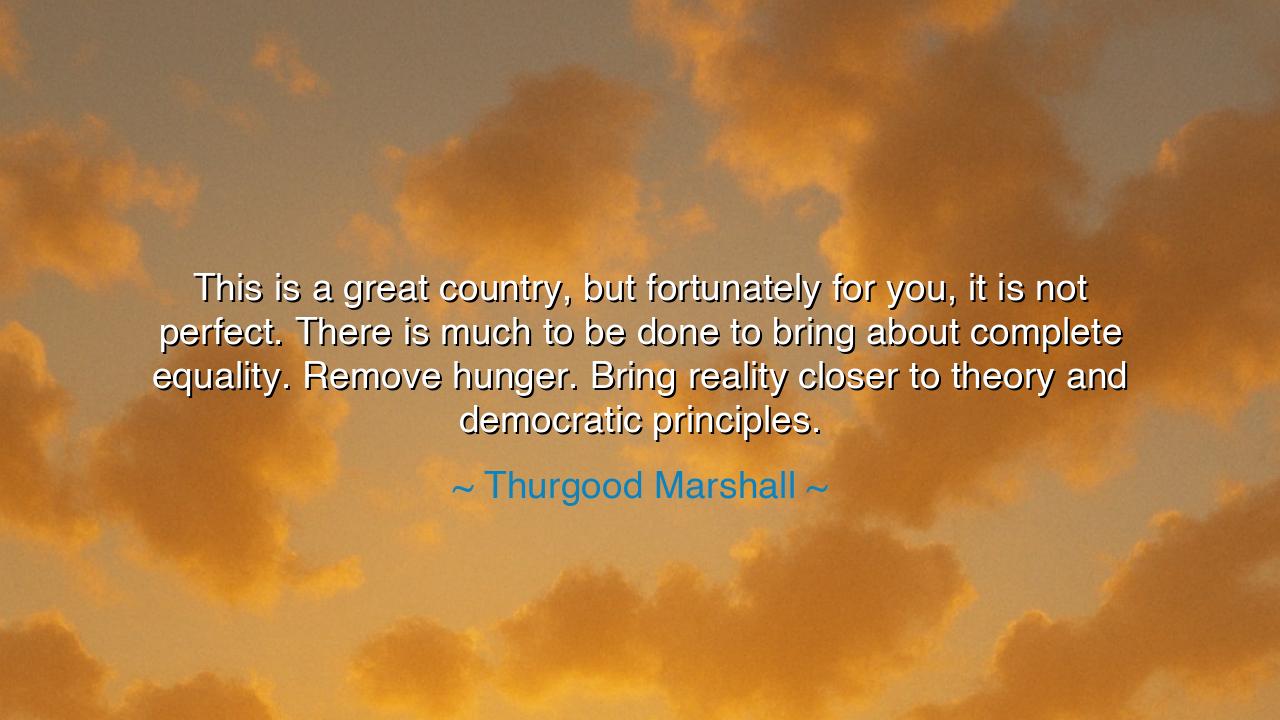
This is a great country, but fortunately for you, it is not
This is a great country, but fortunately for you, it is not perfect. There is much to be done to bring about complete equality. Remove hunger. Bring reality closer to theory and democratic principles.






The words of Thurgood Marshall, the first African American Justice of the United States Supreme Court, echo through the corridors of history with both pride and challenge: "This is a great country, but fortunately for you, it is not perfect. There is much to be done to bring about complete equality. Remove hunger. Bring reality closer to theory and democratic principles." These words are not a complaint, but a call — not a lamentation, but a sacred summons to conscience. They remind us that greatness is not a finished monument carved in marble, but a living endeavor, born of struggle, compassion, and courage. A nation’s virtue lies not in its perfection, but in its capacity to grow beyond its flaws.
When Marshall spoke of imperfection, he spoke with the wisdom of a man who had walked through the burning fields of injustice. As the chief architect behind the Brown v. Board of Education case, he dismantled the legal foundations of racial segregation in American schools. Yet, he knew that changing the law was not enough — the spirit of equality must also be awakened in every human heart. A country, he taught, can be “great” in its ideals and still “imperfect” in its deeds. Thus, it is not hypocrisy to love one’s nation while criticizing it; it is, rather, the highest form of loyalty.
To "bring reality closer to theory" is to confront the sacred promises enshrined in the Declaration of Independence — liberty, justice, equality — and hold them against the mirror of daily life. It is to ask whether a hungry child, an ignored laborer, or a forgotten minority can truly believe those words. Theory without reality is but a dream carved into paper; reality without theory is chaos. Only when both unite does a people become truly democratic. Marshall understood this harmony: that democracy is not a gift handed down from the powerful, but a flame tended by the many, whose persistence gives light to the few.
Consider the story of the Civil Rights Movement, where ordinary men and women — weary, bruised, but unbroken — rose to demand that America live up to its own words. Rosa Parks, sitting silently on a bus; Martin Luther King Jr., preaching of dreams on the steps of the Lincoln Memorial; schoolchildren walking through mobs in Little Rock — these were not acts of rebellion, but acts of reclamation. They were bringing reality closer to theory, translating the promises of democracy into the daily lives of the oppressed. Each protest, each sacrifice, was a note in the long song of justice that Marshall himself helped compose.
The phrase “Remove hunger” is both literal and symbolic. Hunger for food — yes — but also hunger for dignity, for education, for opportunity. A starving body mirrors a starving society, where compassion has withered and justice sleeps. Marshall’s command to remove hunger was not charity, but duty: to lift others as one climbs, to ensure that progress feeds all, not just a privileged few. In this way, the feeding of a child becomes the feeding of democracy itself.
Yet Marshall’s message carries a deeper wisdom: the imperfection of a nation is its salvation. For if a nation were perfect, it would cease to strive; and where there is no striving, there is no growth, no soul. The cracks in the marble are where the light of humanity enters. Each injustice, each inequality, is a reminder that our work is not yet done — and that we, the inheritors of freedom, are the artisans who must continue the carving.
So, let us draw from Marshall’s words not despair but purpose. Let us teach our children to question without hate, to love their land without blindness, and to labor for justice without rest. The task is immense — to heal divisions, to feed the hungry, to uphold truth over comfort — but so too is the reward: a society that mirrors its ideals. For the perfection of democracy lies not in the stars, but in the hands of those who dare to reach for them.
And so, dear listener, remember this truth: a great nation is not the one that has achieved all it promised, but the one that never ceases to pursue what it has promised. Walk forward, therefore, as Marshall did — with vision clear, heart steady, and hands ready to build the bridge between dream and deed.






AAdministratorAdministrator
Welcome, honored guests. Please leave a comment, we will respond soon